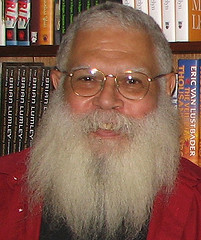
Caroline Small wrote an interesting commenton Samuel Delany’s view of comics and Scott McCloud; thought I’d reproduce it here.
Jeet and Noah: I guess I am still deeply skeptical about the assertion that Alan Moore and Neil Gaiman represent “Delany’s taste” in comics, rather than a strategic choice of writers to call attention to. I guess I just disagree that “taste” is what’s at stake here at all, or even that “taste” is a particularly useful category for understanding the role that Gaiman and Moore play in what Delany has to say about comics. (I realize I’m making a big deal out of something that I’m sure Jeet said casually, but it seems to me a particularly fecund slip…)
It’s not that I don’t agree to some extent: I find it deeply unpalatable when Delany uses words like “powerful, insightful and brilliant” to describe Scott McCloud. McCloud is the epitome of “middle-of-the-road” as far as I’m concerned. But I tend to read Delany’s praise as strategic rather than sycophantic.
I’m not sure what else from comics Delany could engage OTHER than Gaiman and Moore, given his project of deconstructing the binary between art and genre: despite those writers being palpably middlebrow (and with that I certainly agree), comics just doesn’t have a Marge Piercy or even a Sam Delany of its own that he could grapple with instead. And Gaiman/Moore have the strategic advantage, even over Piercy and Delany himself, of being very familiar to a great many people and therefore valuable as illustration. Jeet, are there comics creators/writers whom you think he should write about instead, that would be less disappointing, but still effectively work for his project?
I think the way I phrased my initial comment led to this notion that Delany exhibits some “highbrow” taste in literature, and that he hasn’t shown as sensitive an “ear” for comics. But — to use Jeet’s examples — Nabokov and Updike are really no less middlebrow than Gaiman and Moore. Delany’s fiction leaves no doubt that he reads and engages writers much much much more ambitious than Nabokov and Updike. But his project (and possibly but not necessarily his taste) dictates that he not privilege the highbrow at the expense of the lowbrow. I prefer to view him as capable of such great appreciation of human creativity that he privileges instead a synthesis of the entire spectrum: low, high, and middlebrow. There’s a “hippie appreciation” to his writing about art that I think has to be recognized and taken in context rather than at face value.
So for me the “disappointing” thing here is not that Delany has less sophisticated taste in comics than he does in literature: I don’t think we have access at all to his taste through his criticism, because he is far too fine a critic to be concerned with matters of taste.
What’s disappointing — although, really, it’s not so much disappointing as fascinating — is that as a writer he wasn’t able to make as much hay out of his perspective in comics as he was in fiction. Sam Delany’s prose SF really does participate in and advance his project of challenging the ways in which we presume genre cannot be art: Dhalgren is an essential, if not the essential, text for re-examining the conventional wisdom about how the strictures of genre characteristics preclude literary experimentation. But you both pointed out that his comics do not challenge the binary between genre and art in the same way. That’s interesting. Saying that he has middlebrow taste in comics is not sufficient to account for the fact that what Sam Delany has to offer can’t complicate and “elevate” graphic genre fiction in in the same way that it did prose genre fiction…
It’s a fun thread in general; Caro has some more thoughts, as do Robert Stanley Martin, Jeet Heer, and others.
